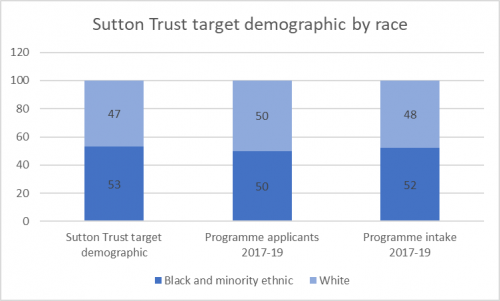Opinion
Like many organisations, we have been working on our diversity and inclusion agenda with increased focus at the Sutton Trust over the last year. Today we see the launch of our inclusion resources on Sutton Trust Online.
As we share these resources with our students, we have taken a moment to reflect on the work we have done so far and the work we still need to do, and are sharing these reflections today.
As a charity, our mission is to improve social mobility and we work specifically with high-attaining students from lower-socio-economic backgrounds to achieve this. The markers we use to assess eligibility for our programmes include free school meal eligibility, secondary school demographics, home postcode and family history of higher education.
We have monitored other characteristics such as race, gender, disability and mental health for many years to ensure our programmes reach our target demographic and are accessible to students, regardless of background. We support a highly diverse group of students each year through our programmes, given the intersections of characteristics such as race with lower socio-economic status.
The focus of our inclusion work, therefore, has been on ensuring that our assumptions of effective targeting were correct and on what we can do as an organisation to better support our students whilst they are on programmes with us.
Based on feedback from our alumni, we have been working on two strands specifically:
- Race
- Mental health
To help us better understand the context and identify what our role could be in supporting this important agenda we have followed a number of different steps:
- Research
Boston Consultancy Group undertook pro bono analysis to explore characteristics such as race and gender and how they intersect with socio-economic status and school attainment, so we could better understand the group of high-attaining students we are trying to reach and support.
The research showed us that we are targeting our programmes well and reaching the students who need our support the most. More specifically, in our most recent cohort of students 47% of students identified as White, 25% Asian, 16% Black, 6% Mixed race and the remainder identifying as another race. In our work, we are also able to break down race beyond these headline groupings so that we can effectively monitor the access and progression of our cohort.
The research also clearly highlighted the intersections of race, socio-economic status and attainment given the increased pool of black and minority ethnic students in our target population, in comparison to the general population.
We also conducted a survey of our students to ask them about race and mental health, their experiences of the programme and what they would like to see from the Sutton Trust. This helped us to shape the project and key areas where students wanted more support.
We found that students reporting a mental health need on our programmes was broadly in line with the national average, with Sutton Trust students on free school meals, in care or young carers having the highest rates of reported mental health.
2. Consultation
We set up a working group made up of alums, corporate partners and university partners, led by our Senior Programme Manager, Jonny Tyndall.
This group met three times over the course of the project to review our survey findings, discuss ideas and share perspectives from different stages in the education cycle. This included personal experience, professional experience of working in diversity and inclusion roles, mental health programming and practical experience of delivering Sutton Trust programmes. We are extremely grateful for the time and expertise this group brought to the project.
3. Develop partnerships
Our mission is social mobility and we have a lot of strengths in working in this area but we knew that, as an organisation, we are not experts in racial equality or mental health so it was important for us to find people who were to ensure we are moving forward effectively.
We are delighted to have set up partnerships with the The Diversity Trust to support us on our race agenda and a partnership with Young Minds to lead our mental health response.
Together these partners are helping us to deliver on our four-stage intervention model:
- Training – for our internal staff and our delivery partners who work directly with Sutton Trust students
- Resources – developing resources and content for our Sutton Trust Online platform that students can access at any time
- Engagement opportunities – developing a series of webinars that students can attend throughout the year
- Signposting – identifying organisations that we can effectively signpost to students who may need additional support or who want to learn more
Elsewhere in the organisation, there has also been work to review our recruitment practices and the diversity of our team. Changes such as data collection on, race and other diversity markers have been added to our existing socio-economic analysis, reviewing our language in job adverts and identifying new places to advertise our jobs will help to ensure we reach the widest pool of candidates possible and we will be reviewing their impact moving forwards. In addition we have recently reviewed the mental health and wellbeing support provided for staff and have developed a selection of new resources. We are also looking at diversity on our advisory boards, identifying a wider range of donors from different backgrounds and conducting research more specifically on topics of race as they relate to social mobility.
Our work is certainly not complete and we are sharing this note today as an update on progress, rather than as a finished product. The work will continue beyond the launch of our resources today to make sure we continue to make the progress we are able to.
The Sutton Trust would like to thank all individuals and alums who have supported this work through working groups, advisory boards and individual conversations.
